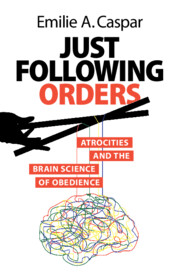Book contents
- Just Following Orders
- Just Following Orders
- Copyright page
- Contents
- Figures
- Preface
- Acknowledgments
- Introduction: Understanding Genocide as a Means to Prevention
- Chapter 1 Listening to the Perpetrators of Genocide
- Chapter 2 A Brief History of the Experimental Research on Obedience
- Chapter 3 How Do We Take Ownership over and Responsibility for Our Own Actions?
- Chapter 4 Moral Emotions under Obedience
- Chapter 5 Just Giving Orders? In the Brains of Those Who Command
- Chapter 6 Desolation Is Everywhere
- Chapter 7 Conclusion: How Ordinary People Stand Up against Immorality
- Epilogue: A Hopeful Horizon
- References
- Index
Chapter 6 - Desolation Is Everywhere
Published online by Cambridge University Press: 25 July 2024
- Just Following Orders
- Just Following Orders
- Copyright page
- Contents
- Figures
- Preface
- Acknowledgments
- Introduction: Understanding Genocide as a Means to Prevention
- Chapter 1 Listening to the Perpetrators of Genocide
- Chapter 2 A Brief History of the Experimental Research on Obedience
- Chapter 3 How Do We Take Ownership over and Responsibility for Our Own Actions?
- Chapter 4 Moral Emotions under Obedience
- Chapter 5 Just Giving Orders? In the Brains of Those Who Command
- Chapter 6 Desolation Is Everywhere
- Chapter 7 Conclusion: How Ordinary People Stand Up against Immorality
- Epilogue: A Hopeful Horizon
- References
- Index
Summary
Wars and genocides only bring desolation. Of course, we first think about the dramatic psychological consequences of those who survived extermination or those who have witnessed their families and friends being killed or mutilated. Psychological and neuroscience research have shown that surviving a psychological trauma leaves long-lasting imprints on individuals with notable life-long post-traumatic stress disorder (PTSD) symptoms, which can also extend to the following generations. Importantly, the psychological disaster observed in the aftermath of a war or a genocide not only touches the victims, their relatives, or their descendants. It also has disastrous consequences on the mental health of the assailants. The chapter argues that in order to stop the cycle of conflicts, we must also understand how both victims and assailants are impacted at the psychological level by their respective experience, and how to help them overcome their demons and potential feelings of revenge. Taking care of their mental health is a step towards stopping cycles of conflict.
- Type
- Chapter
- Information
- Just Following OrdersAtrocities and the Brain Science of Obedience, pp. 168 - 194Publisher: Cambridge University PressPrint publication year: 2024

